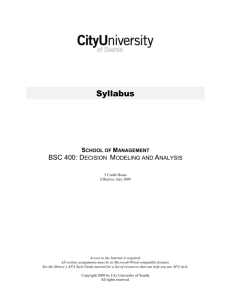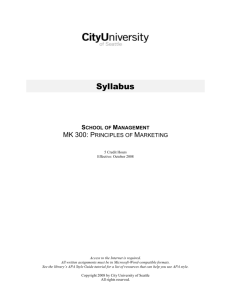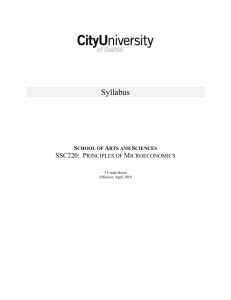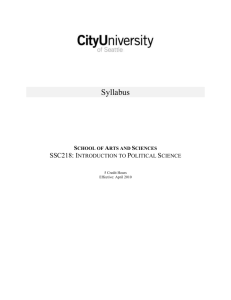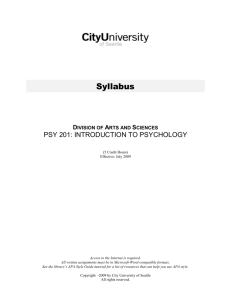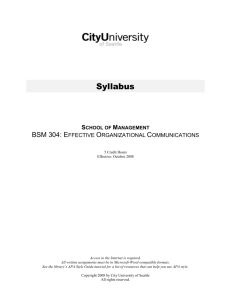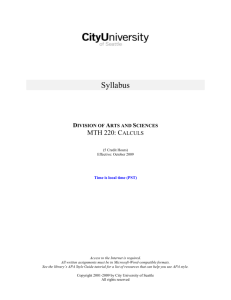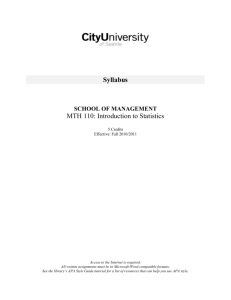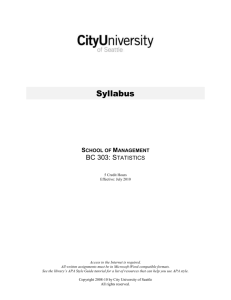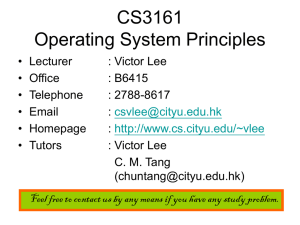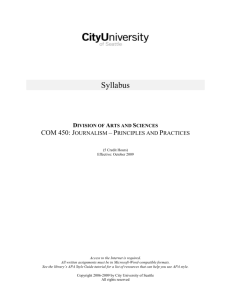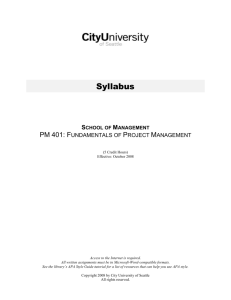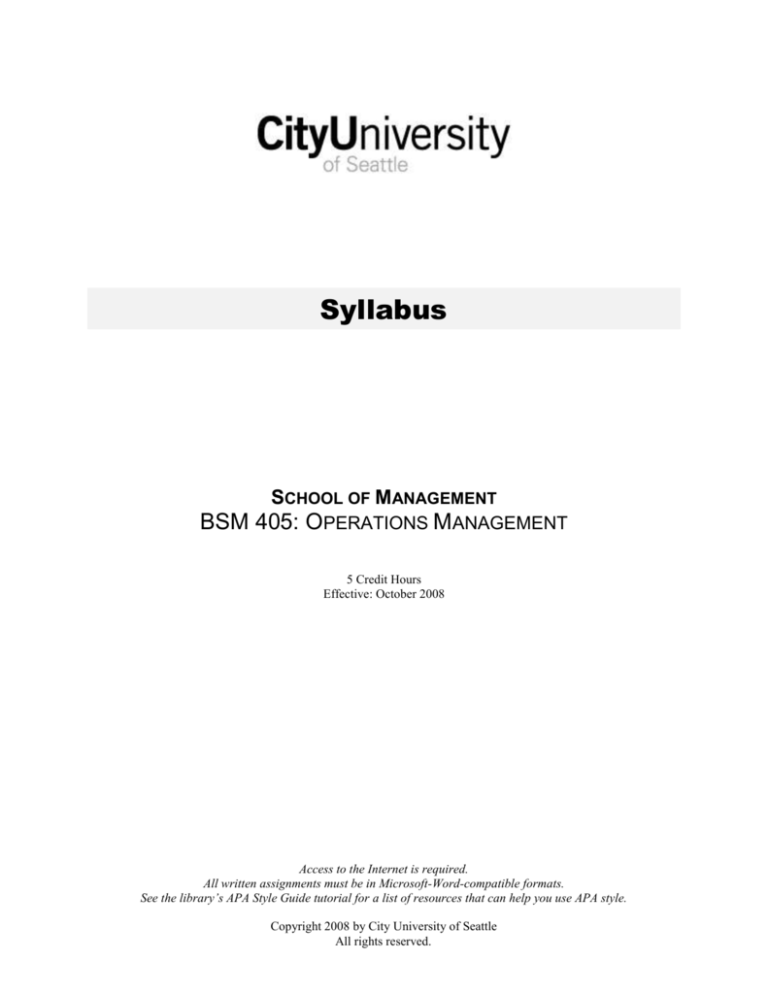
Syllabus
SCHOOL OF MANAGEMENT
BSM 405: OPERATIONS MANAGEMENT
5 Credit Hours
Effective: October 2008
Access to the Internet is required.
All written assignments must be in Microsoft-Word-compatible formats.
See the library’s APA Style Guide tutorial for a list of resources that can help you use APA style.
Copyright 2008 by City University of Seattle
All rights reserved.
BSM 405: OPERATIONS MANAGEMENT
FACULTY
Faculty Name:
Contact Information:
COURSE DESCRIPTION
BSM 405, Operations Management explores operations management in the manufacturing and service
environments. Topics include: cost accounting information for improving efficiency, product and service
quality, total quality management, project management, materials resource planning, value creation,
supply chain management and economic value. Students will focus on how to apply these concepts to
real world operation functions of both manufacturing and services. It is strongly recommended that
College Math and Quantitative Methods be taken prior to this course.
COURSE RESOURCES
Required and recommended resources to complete coursework and assignments are listed on the
My.CityU portal at Library>Resources by Course.
CITYU LEARNING GOALS
The content of this course addresses the following CityU Learning Goals:
Professional Competency and Identity;
Critical Thinking.
PROGRAM CONTEXT
The content of this course aligns with the following program outcomes:
Evaluate the industry and economic sector in which a given organization operates and propose
strategies to succeed;
Appraise the threats and opportunities of conducting business in a world with fewer barriers;
Integrate information technology tools to streamline business processes;
Recommend improvements that align with the company’s strategies, goals and culture;
Integrate foundational knowledge of business functions;
Assess and evaluate relevant information to guide business decisions;
Deliver powerful presentations and produce examples of effective business writing for diverse
audiences;
Lead and mange diverse teams.
BSM405
Page 2
Eff: 10/08
COURSE OUTCOMES
In this course, learners will:
Describe the relationship between customers, corporate management and value creation;
Assess the importance of design quality through measurement and improvement techniques;
Forecast demand and translate that demand estimate into production orders;
Describe the elements of a master plan for capacity and facility planning;
Integrate aspects of materials purchasing and supplier relationships into operations planning;
Develop schedule and cost estimates for a large production project in a corporate environment
from production orders;
Create estimates of economic profit based on costs and sales data from example cases of product
and service production environments.
CORE CONCEPTS, KNOWLEDGE, AND SKILLS
Operations as a Business Core Competency;
Managing Resources;
Economic Value;
Decision Tree Analysis;
Determining Value;
Creating Value;
Product and Service Life Cycles;
Process Design and Improvement;
Production Technology;
Determining and Managing Costs;
Creating Quality;
Measuring Quality;
Project Management;
Supply Chain Management;
Forecasting Demand;
Inventory Management;
MRP;
Transportation;
JIT Systems;
Capacity Management;
Global Performance Measurement;
Facility Location and Layout;
Workforce Management.
OVERVIEW OF COURSE GRADING
The grade you receive for the course will be derived using City University of Seattle’s decimal grading
system, based on the following:
Overview of Required Assignments
Quality Management Paper
BSM405
% of Final Grade
30%
Page 3
Eff: 10/08
Operations Improvement Plan
Final Exam
Participation/Discussions
30%
20%
20%
TOTAL
100%
SPECIFICS OF COURSE ASSIGNMENTS
Quality Management Paper
Any company, regardless of size, product or service, is one to which you can apply the principles of
quality management. If you do not have any work experience on which to base a case example of
your own, you may use a published case with the instructor’s approval, or your instructor may assign
a case. For this paper, you will describe the situation in the case and then apply appropriate principles
of quality management, such as Total Quality Management or Six Sigma. Your instructor will advise
you on what length your paper should be. At the very least your paper will include the following
elements:
Application of Methods:
Apply the methods to the selected organization. They should be discussed in order. You
will clearly define method. Explain whether it is being followed, ignored, or partially
followed. Explain which fact shows you the situation. If a method is not being followed,
you may make reasonable suggestions for how it might be successfully implemented, or
explain why it should not be applied. If it is being followed, you will explain how it is
being followed and whether or not it is working satisfactorily.
Problem Definition:
Select the most critical issue from your first analysis that needs to be resolved because it
is not being followed. Give the most basic explanation possible. You should keep the
problem statement simple and address the one (1) point that you think is the most
significant.
Organization and Issues Descriptions:
Describe the organization and the issues that have contributed to the problem that you are
addressing.
Prioritization:
Outline an implementation process to increase the organization's compliance with
methods that are not in compliance. Identify what you think should be done first, second,
and so on and why you have selected that order.
Conclusion:
Summarize what you think the “bottom line” results will be (aspects such as financial
data, supplier relations, customer satisfaction, organizational behavior, productivity, and
so forth) if your improvement plan were to be successfully implemented.
Operations Improvement Plan
This is a team effort. The basis for this paper will be one of the following: a case assigned by your
instructor, a factual case from your own work experience, or a published case provided by your instructor.
The case should be treated as a problem presented to your team by your company’s top management for
analysis and a recommended course of action. With specific directions from the instructor, your team will
choose from this list of concerns below about the case, in discussing and making a recommendation for
improvement in the operations of the company. The team will produce a position paper to be turned in
for grading. The team will prepare a presentation to be scheduled during the end of the course.
Company (or organizational) strategy;
BSM405
Page 4
Eff: 10/08
Process design;
Determining and creating value;
Determining and managing costs;
Quality measurement and management;
Resource planning;
Supply chain;
Lean systems;
Capacity planning and demand estimating;
Facilities management;
Workforce management.
Final Exam
You will take a final exam in the course to reinforce the course materials. The final exam will test your
ability to utilize operations management techniques to develop and create estimates, schedules,
valuations, and assessments within a production environment.
Participation/Discussions
Whether in class, online, or in a mixed mode setting, students will be graded on their participation in
classroom discussions; their ability to present, explain, or defend alternative viewpoints; and the degree to
which they have mastered the concepts and principles inherent in the study of accounting at this
introductory level. Written work will be assessed not only on relevance to the subject presented, but also
on adherence to good written form and professional presentation.
COURSE POLICIES
Late Assignments (Instructors will put their late policy here. Below is an example.)
A 10%, per each day late, penalty will be assessed for all late work. Assignments more than 7 days late
will not be accepted and receive a grade of zero.
Participation
Students are expected to be actively engaged in a discussion or other activities. Active engagement
means contributing substantive, thoughtful and reflective responses. For online classes, students must
submit at least one quality posting, response to another’s posting, or other assigned work on four separate
days during the school week (Monday through Sunday). Additionally, students must post their initial
responses during the first three days of the week, and their responses to other students’ postings during
the last four days of the week.
Professional Writing
All assignments for this course should be of professional quality. The writing should always take into
consideration the intended audience. Hand written work will not be accepted.
This course requires you to use the American Psychological Association (APA) style in preparing any
required research papers, or any written work where other sources are used. References should be cited
for all facts, ideas, conclusions, and opinions that are not your own.
BSM405
Page 5
Eff: 10/08
A proper title page should preface all written assignments, unless otherwise stated. The title page should
include: your name, the title of the paper, the name and number of the course, your course start date, the
date submitted, and the name of the instructor.
Your work should be typed or word-processed on white 8 ½ by 11 inch paper. Any narrative sections
should be double-spaced. Some assignments many require that your work be prepared on a computer
spreadsheet.
UNIVERSITY POLICIES
You are responsible for understanding and adhering to all of City University of Seattle’s academic
policies. The most current versions of these policies can be found in the university catalog that is linked
from the CityU Web site.
Academic Integrity
Scholastic honesty in students requires the pursuit of scholarly activity that is free from fraud, deception
and unauthorized collaboration with other individuals. You are responsible for understanding CityU’s
policy on scholastic honesty and adhering to its standards in meeting all course requirements. A complete
copy of this policy can be found in the university catalog in the section titled Scholastic Honesty under
Student Rights & Responsibilities.
Attendance
Students taking courses in any format at the University are expected to be diligent in their studies and to
attend class regularly. Regular class attendance is important in achieving learning outcomes in the course
and may be a valid consideration in determining the final grade. For classes where a physical presence is
required, a student has attended if s/he is present at any time during the class session. For online classes,
a student has attended if s/he has posted or submitted an assignment during the session. A complete copy
of this policy can be found in the university catalog in the section titled Attendance Policy.
SUPPORT SERVICES
Disability Resources
If you are a student with a disability and you require an accommodation, please contact the Disability
Resource Office as soon as possible. For additional information, please see the section in the university
catalog titled Students with Special Needs under Student Rights & Responsibilities.
Library Services
In order to help you succeed in this course, you have access to library services and resources 24 hours a
day, seven days a week. CityU librarians can help you formulate search strategies and locate materials
that are relevant to your coursework. For help, contact a CityU librarian through the Ask a Librarian
service. To find library resources, click on the Library link in the My.CityU portal.
SmartThinking
BSM405
Page 6
Eff: 10/08
As a CityU student, you have access to 10 free hours of online tutoring, including writing support, from
certified tutors 24 hours a day, seven days a week. Contact CityU’s Student Support Center at
info@cityu.edu to request your user name and password.
BSM405
Page 7
Eff: 10/08

